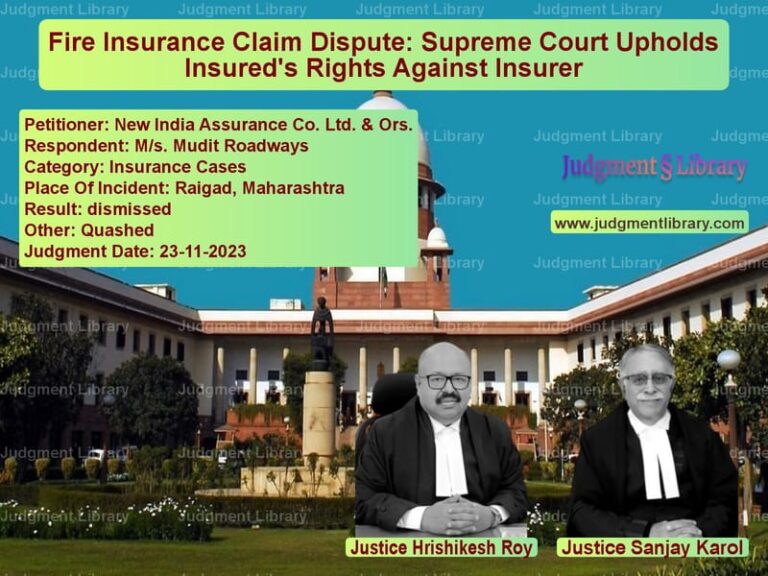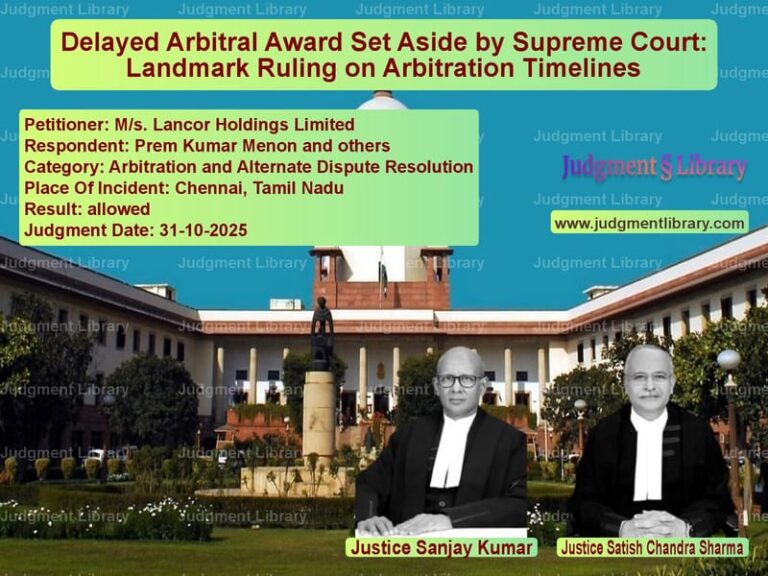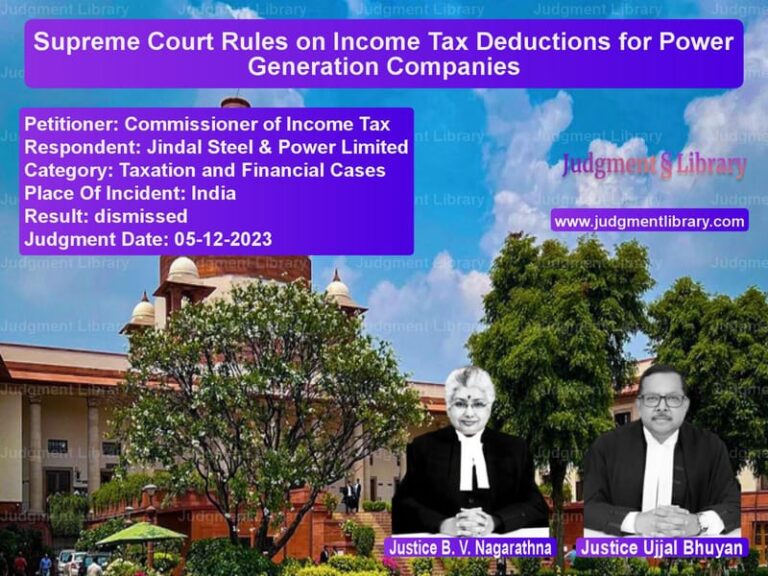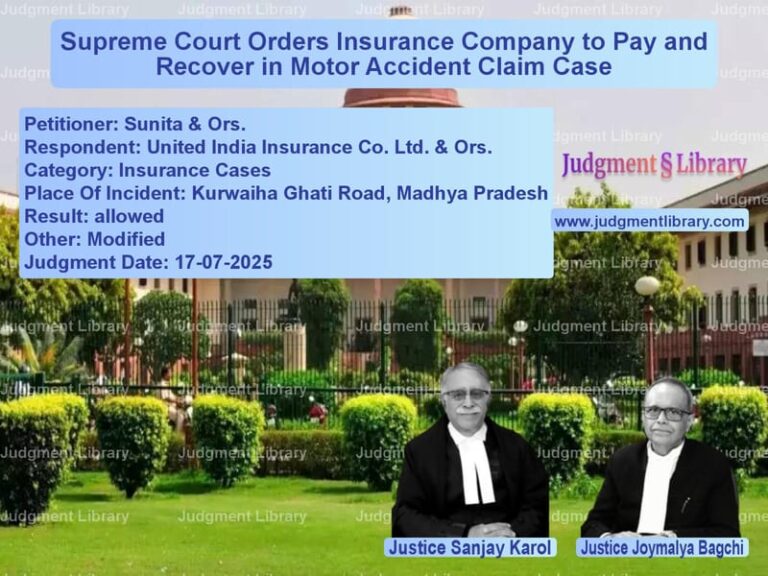Supreme Court Enhances Compensation in Motor Accident Claim for Housewife and Child
The case of Rajendra Singh & Others vs. National Insurance Company Limited & Others revolves around compensation for the death of a housewife and her minor child in a tragic road accident. The Supreme Court was tasked with determining whether the compensation awarded by the Motor Accident Claims Tribunal (MACT) and later affirmed by the High Court was just and adequate.
Background of the Case
On December 25, 2012, the deceased, a 30-year-old housewife, and her 12-year-old daughter were traveling in a horse cart to a religious congregation when they were hit by a bus. Both lost their lives in the accident. The claimants—her husband and three minor children—filed for compensation under the Motor Vehicles Act, 1988.
The MACT assessed the notional income of the deceased housewife at Rs.36,000 per annum and applied a multiplier of 17. However, the Tribunal deducted 50% of the amount on the ground of contributory negligence, concluding that the horse cart was in the middle of the road at the time of the accident. After additional considerations, the Tribunal awarded:
- Rs.4,59,000 for the housewife’s death, reduced to Rs.3,54,500 after contributory negligence deductions.
- Rs.2,70,000 for the minor child, reduced to Rs.1,60,000 after similar deductions.
- An additional 7.5% interest on the compensation amount.
Displeased with the award, the claimants sought an enhancement, but the High Court dismissed their appeal. This led them to file a further appeal before the Supreme Court.
Petitioner’s Arguments
The claimants contended that:
- The notional income of the deceased housewife was wrongly assessed, as she also had a dairy farm business, earning Rs.5,000 per month.
- No amount was awarded for future prospects of the deceased.
- The minor child’s notional income should have been assessed at Rs.54,000 per annum.
- The deduction for contributory negligence was unjustified, as the deceased were mere passengers in the horse cart and had no control over its movement.
Respondent’s Arguments
The National Insurance Company countered by arguing:
- There was no proof of income from the alleged dairy business.
- The Tribunal correctly applied contributory negligence as the accident occurred due to the horse cart’s position on the road.
- Future prospects are only considered where a fixed income source is proven, which was absent in this case.
Supreme Court’s Observations
The Supreme Court carefully examined the facts and legal precedents, making the following key observations:
- “There is no evidence to establish that the deceased housewife was involved in a dairy business; however, the contribution of housewives to the household economy must not be underestimated.”
- “It is unjustified to apply contributory negligence to mere passengers in a vehicle who had no control over its movement.”
- “Compensation should be granted considering the value of services rendered by a housewife, including household duties, childcare, and family support.”
- “The deceased child had a full life ahead, and compensation for loss of prospective happiness must be awarded.”
Final Judgment
The Supreme Court ruled in favor of the appellants and made the following adjustments:
- The notional income of the deceased housewife was increased to Rs.5,000 per month with a multiplier of 17, leading to a revised compensation of Rs.7,65,000.
- Future prospects at 40% were added, enhancing the total amount to Rs.11,96,000.
- The deduction for contributory negligence was removed, restoring full compensation.
- The minor child’s compensation remained at Rs.2,95,000 but was reaffirmed as just and proper.
Implications of the Judgment
This ruling has significant implications:
- Recognition of Housewife’s Contributions: The Court reaffirmed that a housewife’s role has economic value and should be compensated fairly in accident claims.
- Rejection of Unfair Contributory Negligence: The decision clarified that passengers should not be penalized for road positioning when they had no control over the vehicle.
- Standardization of Compensation for Children: The ruling emphasized the need to consider the future prospects of young accident victims.
Conclusion
The Supreme Court’s decision underscores the importance of equitable compensation in motor accident claims. By enhancing the awarded amount and rejecting unjust deductions, the Court upheld the principles of fairness and justice for victims’ families.
Petitioner Name: Rajendra Singh & Others.Respondent Name: National Insurance Company Limited & Others.Judgment By: Justice Navin Sinha, Justice B.R. Gavai.Place Of Incident: India.Judgment Date: 18-06-2020.
Don’t miss out on the full details! Download the complete judgment in PDF format below and gain valuable insights instantly!
Download Judgment: Rajendra Singh & Oth vs National Insurance C Supreme Court of India Judgment Dated 18-06-2020.pdf
Direct Downlaod Judgment: Direct downlaod this Judgment
See all petitions in Road Accident Cases
See all petitions in Compensation Disputes
See all petitions in Motor Vehicle Act
See all petitions in Negligence Claims
See all petitions in Judgment by Navin Sinha
See all petitions in Judgment by B R Gavai
See all petitions in allowed
See all petitions in Modified
See all petitions in supreme court of India judgments June 2020
See all petitions in 2020 judgments
See all posts in Accident Cases Category
See all allowed petitions in Accident Cases Category
See all Dismissed petitions in Accident Cases Category
See all partially allowed petitions in Accident Cases Category







